Updated annotations after my second read of Spring Snow, in Sep. 2023
Habla Mishima de la sensibilidad extraordinaria de Kiyoaki. Pienso en la sensibilidad japonesa, que imagino más conectada a la naturaleza, al sol, a ser en el jardín.
Se menciona el tradicional estilo de peinado Marumage, y ruedo entre threads podridos de Tumblr por un rabbit hole de peinados de geisha. Casi papiroflexia. Qué agudo fashion statement sería aparecer luciendo cualquiera de ellos:
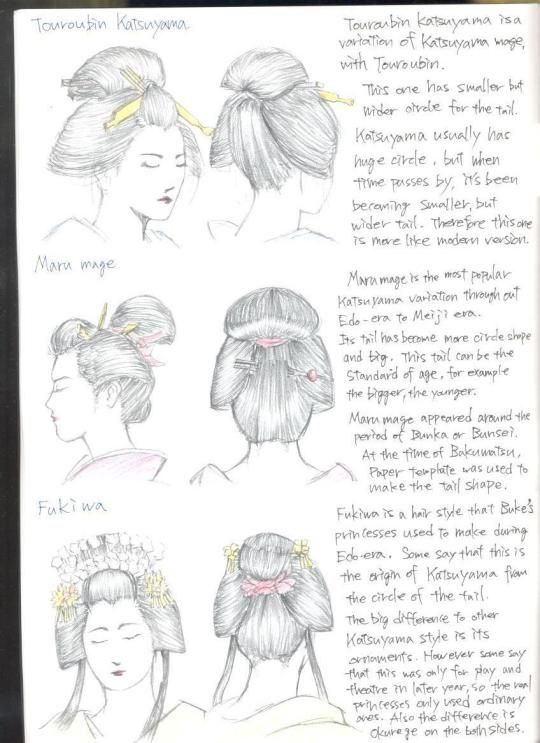
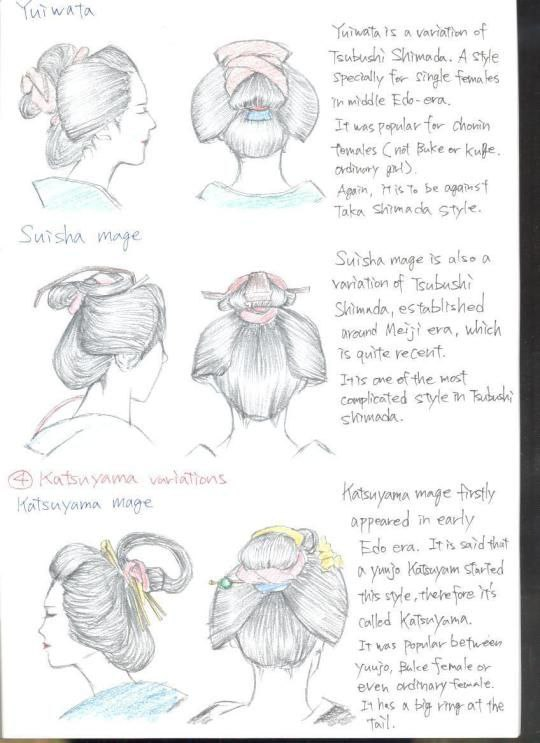
In the first paragraph of the second chapter there is already a positive allusion to suicide: “[…] the supremely noble example of the principal, General Nogi, who had committed suicide to follow his emperor in death […] (because of the emphasis in this) an atmosphere of Spartan simplicity had come to permeate the school”
- A direct relationship between this suicide and militarism is drawn, not only by evoking Sparta, but mentioning later that Kiyoaki disliked this ambient at school because of, literally, his aversion to militarism.
- If suicide is the final connector between discipline, will and destiny in Mishima, how do we read this connection with militarism?
“The Marquis never seemed as happy as when dispensing useless knowledge of this kind” (he was discussing wine)
Kiyoaki’s Otochimachi (ceremony in which, by looking at the moon’s reflection in water, or the absence of such, the life fortune of the young one is set) is discussed. I fail to find any references to such ceremony online. Is it real?
“For everything sacred has the substance of dreams and memories, and so we experience the miracle of what is separated from us by time or distance suddenly being made tangible. […] Once we are even marginally separated from what we can touch, the object is sanctified; it acquires the beauty of the unattainable, the quality of the miraculous.”
- Will as the executive power of materializing what has the substance of dreams and ideas
No deja de brillar como brillan los diamantes esta prosa angelical cuando el tema se vuelve vulgar, novelesco, telenovelesco incluso; me enerva Satoko hablando de amor como ningún otro contenido ha hecho jamás.
Se quedó esta vez Satoko con la cara de Lauren Tsai. Genial.
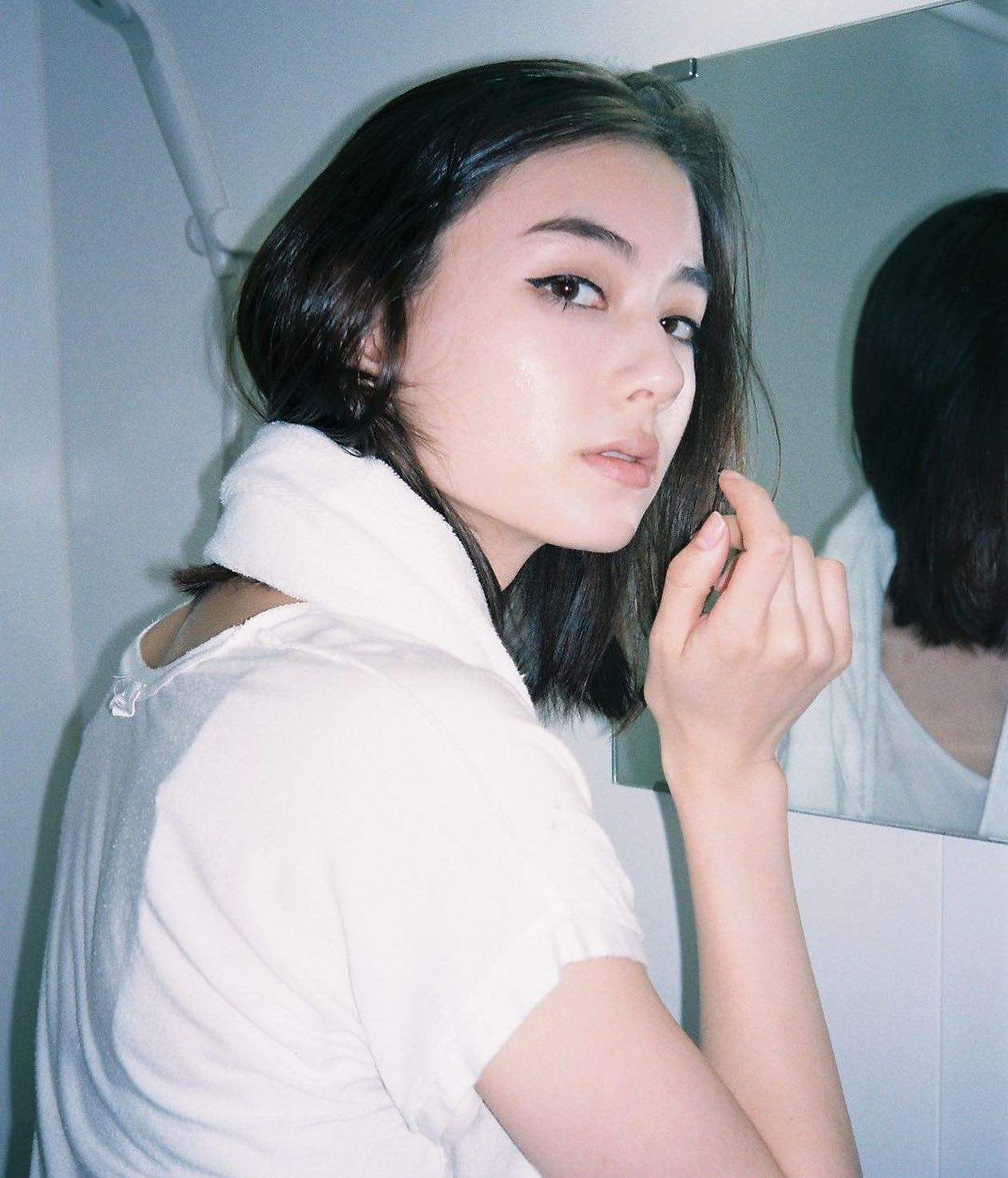

“Seeing her there and catching the hint of a flashing smile, Kiyoaki was ready to forgive her everything”
“It was a smile that seemed to imply much more than the circumstances demanded”
Me sorprendo encontrando un tono esperanzador en las quejas de Iinuma sobre la decadencia moderna; “How long must this age of the effete and the contemptible endure? […] Men think only of money and women. Men have forgotten everything that should be becoming to a man” - Am I not lost in modernity in a similar fashion to the one he proposes? is a different masculinity, one aimed at honor and discipline, something to learn here, from the purity of this art, from Mishima?
“This tranquil old lady knew that nothing in human affairs could be counted on to turn out precisely as intended”
Ch 13. a conversation between Honda and Kiyoaki starts building up the running topics of will and destiny. Discipline is not discussed yet, the points made are generalities on what will can be in a deterministic reality.
- Free will and determinism reconcile understanding the self as the process of being.
“To live in the midst of an era is to be oblivious to its style. […] It may be that your world of feelings represents the style of this era in its purest form”
“Kiyoaki looked at the faded photograph of his two uncles in uniform on the wall. Their military dress seemed to him to preclude any possible bond between them and himself”
“Does history ever obey the will of men?”
- History fits better in reality understood as just the given context, an accident. Not a byproduct of human will, this is, the being of humans; nor a designed progression forward.
“With every minute, every second that passed, the cherry blossoms sank into deeper, darker intimacy with the evening sky. Kiyoaki was plunged into a feeling of foreboding.”
- Marvelous use of color and light to end up drawing such thing as a feeling of foreboding.
The banquet menu in Ch. 20 reads dramatically boring and far from what a Japanese fine dinner would be these days. Shocking to think how quickly gastronomy has developed. This is the menu as presented in the English translation:
“Those who lack imagination have no choice but to base their conclusions on the reality they see around them. But on the other hand, those who are imaginative hace a tendency to build fortified castles they have designed themselves, and to seal off every window in them”
Are this fortified views, interior worlds, something more Japanese? Does it have something to do with the sensitivity for beauty?
I sense a negative connotation in all this. Is he being vocal against the world of imagination, of feelings, of literature ultimately? This would then be a veiled passage against the conclusions in Sun and Steel.
“The relentlessness of his (Iinuma’s) discontent, his rancor, his negative attitude to life, had all weighed heavily on Kiyoaki, try as he might to feign immunity”
- With a negative attitude to life, one can and will effectively be toxic in this manner to everyone who pays attention, never mind final intentions, inner spirit. How easy it is to detect and avoid individuals playing this role has sadly been a late realization for me. I wonder how much have them darkened my cosmovision.
All characters still show hurting inarticulation, deep inability to accept and express their feelings; but when the executor of such weakness is Iinuma, I read it more as a side effect of the social constructs that punish him, a class situation.
- How much of this happens in reality? How much of real inarticulation is more of a class constraint than a lack of skills and maturity?
“He professed to live for sentiment alone, but circumstances now compelled him to learn the politics of the intellect”
- May intellectually engineering one’s way forward be the final shape of will
In Ch. 24, during a scene in which Kiyoaki analyzes a fond memory of his, a calligraphy class with Satoko during their childhood, two hakas from the Okura One Hundred Poets anthology are written by the kids and directly presented in the book:
Kiyoaki wrote a verse by Shigeyuki Minamoto:
I feel the wind’s keen force As waves break over rocks Worn down by loneliness I dream of days gone by.Satoko wrote a verse by Yoshinobu Onakatomi:
When days gives way to night And guards kindle fires The thoughts of other times Come alive within me
Ch. 25 is delivered over my cheeks as if it was napalm.
- Got the feeling that the effective content of the book pivoted towards larger, denser space building starting here: the grass during the ring search, the dark interior of the building during Honda’s attendance to the trial, the beach during Kiyoaki and Satoko’s night…
Apart from light, the use of weather conditions, rain in this case, is at the core of Mishima’s way to form and utilize space for ambience (pg 208, 209).
In my eyes, law, human passion, and their confrontation, are served as another layer on the discussion of will and discipline. There may be a space to defend the social contract from here.
Found appealing how unstoppable, inevitable Kiyoaki is when forcing Tadeshina to organize an encounter with Satoko’s imperial wedding has been agreed. He is here destiny himself.
- Life is purest in these moments of inevitability and anticipation.
“And Kiyoaki, too, was a fascination […] but that instead of being life-giving, carried the seeds of a fateful end”
- There is something of a refined magic realism in presenting such forebodings, in such conclusive tone, when closing a chapter; always as loose ideas, sutil feelings.
“But now that old wars are finished, a new kind of war has just begun; this is the era for the war of emotion. The kind of war no one can see, only feel — a war, therefore, that the dull and insensitive won’t even notice. But it’s begun in earnest. The young men who have been chosen to wage it have already begun to fight. And you’re one of them — there’s no doubt about that”
“Had the woman been thin, her very thinness would have embodied this for them. But since she was plump, her plumpness served just as well”.
Ch. 32 closes again with a veiled premonition of sorts.
- Is ending like this an established structure Mishima repeats? I definitely have noticed it multiple times in this book. It would also make form fit the running topic of destiny.
“The school rules forbade smoking, but the authorities allowed the upperclassmen a certain amount of laxity, provided they did not go so far as ti smoke openly. The boiler room in the basement had thus become a haven for smokers and was known as ‘the Twist Room’”.
- Were spaces like this happening around me? — privileged social clubs favored by the institutions
“Even now, as the four of them puffed on their cigarettes beneath the open sky without fear of being observed, they sensed the lingering, secret pleasure that went with smoking in the Twist room.”
- How much of these type of taboos, mainly secrecy, is in my relationship with drugs?
“And so, under the protective eye of the Great Buddha, whom the princes worshipped every morning on top of the ridge, summer waned in languorous beauty.”
“Then he gazed blankly toward the distant waterfall and wondered why the water that flowed unceasingly down its nine levels never ran dry. How strange that this smooth continuity should never be broken! He felt it to be like an image of his emotions”
“Now that he was plunged in despair, he could no longer doubt his love for her”
How elegantly designed is the schema of events, to present somebody who can have everything in front of the actually impossible.
In Ch. 41, while we attend to Count Ayakura’s recapitulation of some dark and foreboding events, Mishima narrates a very explicit ghost story, presented as pornographic scrolls the characters where consuming.
- Is hentai this old? Was this common? What were the topics compared to modern ones?
Ayakura overhears soldiers singing outside the inn where he plots a future betrayal to the Marquis. Also foreboding;
- To the battlefield Torn with steel and fire, The fate of the nation’s defense Falls on you […]
Satoko’s tonsure ceremony represents her resignation from the world. While this may have metaphoric value, it flourishes as a independent and brilliant aesthetic exercise. So pervasive I think about changing my hair. Maybe dying it a darker blonde like Jeremy Allen White. Maybe a Buddhist clean cut, like Yukio, like Satoko.
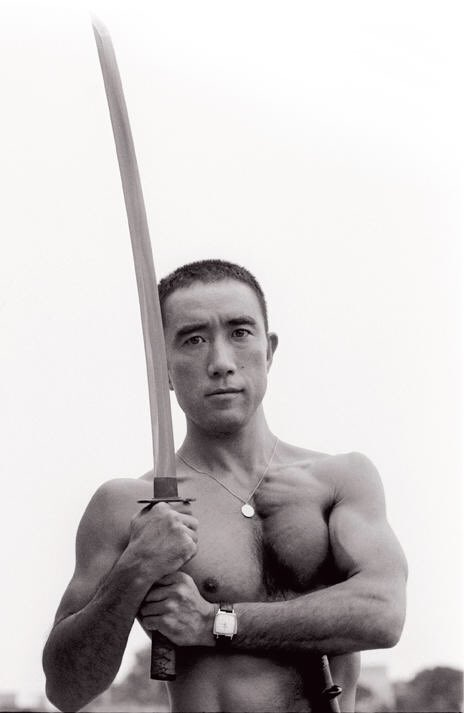
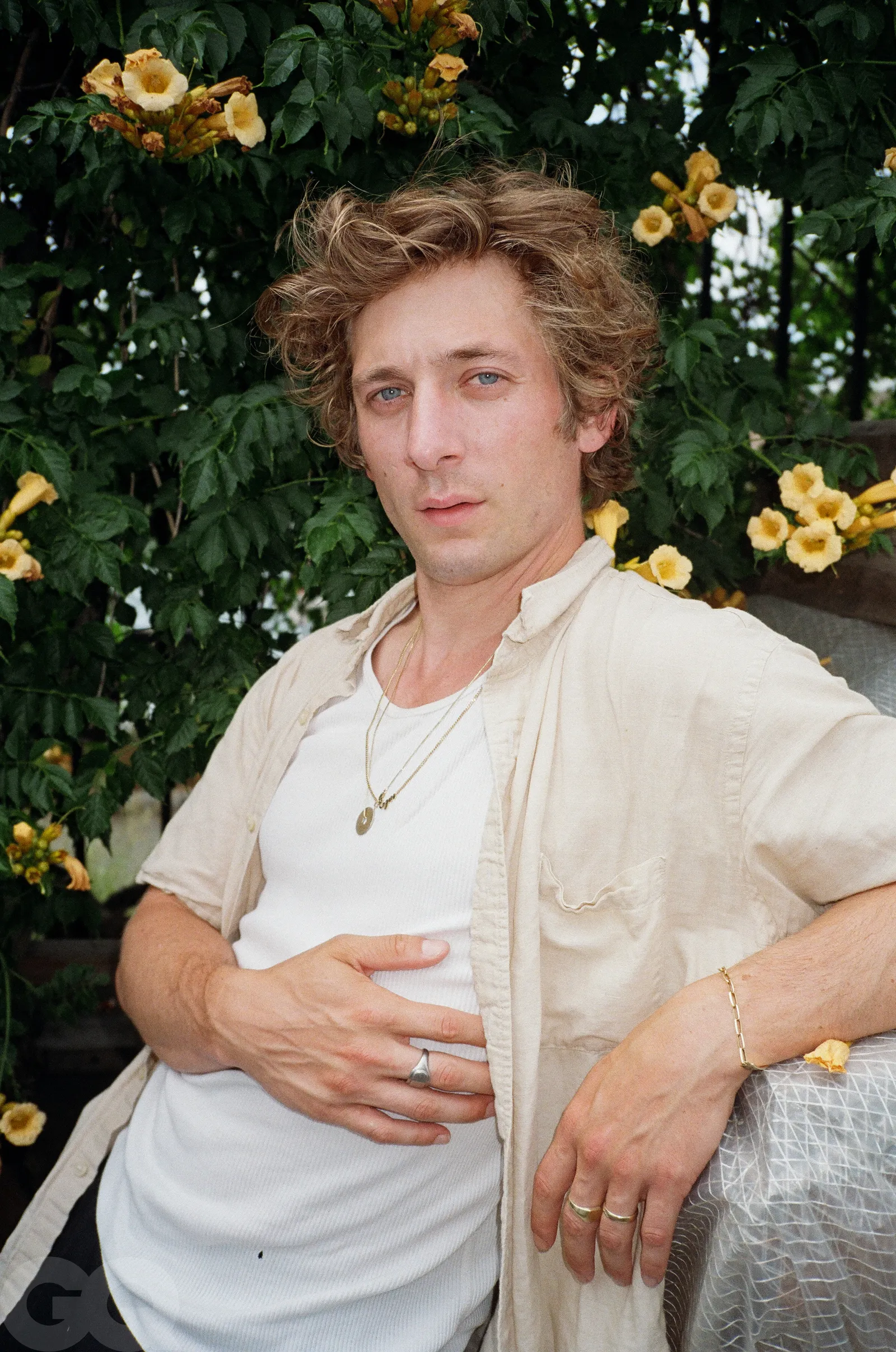
“After all, wasn’t the image of a domineering Satoko no more than an illusion he had created out of his own timidity?”
- In the unforgivable mismatch between what I sense and what they have thought, how much negativity have I poured over all my loves?
“His dreams ceased to tell stories objective enough to be recorded in his journal. Hope and despair, dream and reality, now came together to cancel each other out, the border between them as vague as the shoreline against which the rolling waves break without cease”.
“He now knew that the future would only reveal itself at this pace, foot by foot, yard by yard, as he painfully struggled forward”
“In one circle of pale yellow light the lamp above them caught the ultimate symbols of two diametrically opposed worlds to which these young men had given themselves. One of them lay critically ill for the sake of love. The other was preparing himself for the grave demands of reality”
- So close, so far. The world we are in, the world we dwell in. Kiyoaki and Honda may be here a representation of mind and body, of the insurmountable duality.